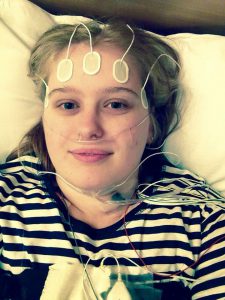SomnusNooze
 What if you decided to take a nap but didn’t wake up for 6 months? You might think this is a version of the famous “Rip Van Winkle” story by Washington Irving, but it’s actually the story of L.B., a person with IH in Scotland. She came home from work one day in 2015 and fell asleep for 6 months. Her “Personal Journey” story is set forth below, and chronicles her 2-year struggle to obtain a correct diagnosis, which turned out to be idiopathic hypersomnia (IH).
What if you decided to take a nap but didn’t wake up for 6 months? You might think this is a version of the famous “Rip Van Winkle” story by Washington Irving, but it’s actually the story of L.B., a person with IH in Scotland. She came home from work one day in 2015 and fell asleep for 6 months. Her “Personal Journey” story is set forth below, and chronicles her 2-year struggle to obtain a correct diagnosis, which turned out to be idiopathic hypersomnia (IH).
In Summer 2015, I came home from work one day and fell asleep. Sounds pretty normal, except for the fact that I didn’t get up for 6 months.
At first I thought I was maybe just pushing myself too hard at work and had a little bit of exhaustion. But when I failed to improve, I knew something was up.
Most days I was sleeping anywhere from 16-20 hours and still waking up completely exhausted. There was no waking me up, I wouldn’t eat, I wouldn’t shower, and I struggled to make the few steps to the bathroom.
I visited my GP and had lots of tests that diagnosed quite a few underlying health issues, which could all be treated with medication, but sadly there was no improvement.
In late 2015, I went to see a chronic fatigue specialist, as there was reason to believe this could be the cause. The consultant saw me once and told me it was way beyond his remit, so he referred me to meet a consultant who is head of the department of sleep medicine in Edinburgh.
I was absolutely desperate for an answer, my job suffered, my social life suffered, my boyfriend at the time left me for someone “more awake”, and it felt like there would never be an answer. I had an overnight sleep study and daytime sleep latency tests. I had blood tests, and I had scans. I waited 6 months for the full results, only to be told I simply wasn’t sleeping.
I was confused. All I did was sleep, so how could I not be sleeping?! The sleep tests I had showed that although I felt I was in a deep sleep, I was essentially not sleeping at all. My body wasn’t getting the opportunity to rest, and I was essentially having a very light 16-hour nap.
As the sleep specialist wasn’t overly familiar with this, we started trying to fix the sleep quality. I followed a strict sleep hygiene routine, and I was given medication to relax my muscles and the natural sleep hormone “melatonin” to force my body into shut down mode. In the mornings, I would put on a light box and had to sit in front of this for 40 minutes to burn off the melatonin to allow my body wake up. I also used the light box after I ate lunch.
I persevered with this for around 6 months but was still wandering around in a haze of tiredness. Concerned, my consultant arranged for me to spend another night in the hospital, repeating the study to see how the medication had improved things. By mid 2017, the results were in. There was no improvement in my sleep, and my body was beginning to struggle to cope with the lack of sleep. I was eventually diagnosed with a rare sleep disorder called idiopathic hypersomnolence (aka idiopathic hypersomnia).
Finally I had a name! This meant we knew what was wrong, and we could fix it. Only, we couldn’t, because there isn’t a cure, and with only 1 in 200,000 diagnosed, there is no research or money going into treatment.
Frustrated, my consultant tried to explain to my family that in order to feel how I felt on a daily basis, they would need to be awake for 3 days straight. The disorder affects my balance, and it also affects my brain, meaning I no longer have a long-term memory. I struggle to follow things and understand things. My speech is affected. I can’t find the words, or words will join up together to create a new word. I forget names of people and of items, I fall and bump into things often, and occasionally, I will just go to sleep in the middle of my everyday life. I’m no longer allowed to go out alone in case I fall asleep somewhere. I’m not allowed to cook because it’s more than likely that I’ll wander off, fall asleep, and forget about it, despite the fire alarm being super-enthusiastic about my cooking.
At my worst, I’d fall asleep in the car, I’d fall asleep in restaurants, I’d sit down and sleep on the stairs in my house, I’d fall asleep in the bath for hours on end, and you could often find me curled up on the floor having a “wee rest”.
We started on a regime of trying “wakefulness drugs”. Excited at the prospect of being able to go a whole day without a nap, I tried a drug called modafinil. I had read the reviews and spoken to other people who talked about how it had turned their life around, and I can’t lie, I was buzzing. For 3 months, I took this drug, which had very little to no success, despite altering the dose on a regular basis.
Down but not beaten, we decided to have me try the drug Ritalin. This was stronger, which meant that there was a better chance of me having a few good hours of awake time. But surprisingly, nothing happened. I was exhausted; in the words of my consultant, I was “sassy” and even went as far as accusing him of giving me placebo medication.
At our absolute wits end, in February this year, I started taking a drug called dexamfetamine. Essentially, I am taking speed. Although it’s not a long-term fix, taking this drug twice a day means that I have at least a few hours a day where the fog clears and I get the opportunity to be a “normal” person.
Despite being advised that it’s not a great idea to work, and education was out of the picture, I decided I wasn’t going to lose my life to sleep. I continue to work and even tried going to college and then university.
Three months ago, I sat in court in front of a judge, a GP, and disability advisor, with the opportunity to try and explain my condition and how it affects my life. My consultant wrote a report about the disorder and how it affected me on a daily basis. What was I told? I was advised that really all I needed to do was “try harder”. To make matters worse, I was penalized further because I had decided to maintain a part-time job. I was told that I didn’t really have a “medical condition”.
I’m lucky to have a consultant who wants to fight in my corner, but I’ve been told the only way to improve the lack of knowledge and stigma was to tell people about my condition. Raise awareness from the inside out.
Of course I’m sad I have this disorder. I don’t get the chance to go to nightclubs, work nights out, family events, or even maintain a normal social life. I have to have at least 12 hours of sleep at night in order to have half a chance of not napping during the day.
I don’t like talking about it, and I feel embarrassed explaining to people. But this is the only way to give people some understanding, raise awareness, and hopefully, one day, create enough hype that there is funding in place for a cure.
I am incredibly lucky to be surrounded by my family, a boyfriend who doesn’t mind that my ideal date is nap and nuggets, and a few close friends who are not uncomfortable because of my disorder.
Increasing awareness provides me with a safety net – if you find me asleep somewhere, you will know I’m not dead; just give me a nudge awake and send me on my way! And a little food for thought – just because you can’t see someone’s illness, doesn’t mean it’s not there and they’re not struggling.
L.B. – Livingston, West Lothian – Scotland

